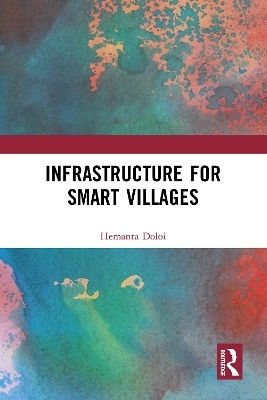
Infrastructure for Smart Villages
Seiten
2024
Routledge (Verlag)
978-1-032-62229-3 (ISBN)
Routledge (Verlag)
978-1-032-62229-3 (ISBN)
This book intends to initiate a fresh articulation of need-based infrastructure provisions in rural contexts. It is key reading for development, planning and infrastructure courses as well as professionals and researchers involved in international development, aid and provision in rural areas.
This book intends to initiate a fresh articulation of need-based infrastructure provisions in rural contexts. Departing from the conventional theories and practices of infrastructure planning and development applied in urban settings, the book presents a comprehensive suite of technical and non-technical indicators that rationalise fit-for-purpose planning, development, and operations of rural infrastructure. Drawing from global practices in public and private sectors and research-based evidence, a distinctive argument is put forward for promoting location-specific infrastructure development from effectiveness, practicality, affordability, and sustainability perspectives. The argument encompasses wider social, cultural, and economic contexts that are unique to rural settings and the book highlights a clear roadmap of how the UN’s sustainable development goals (SDGs) are at the core of developing rural communities with necessary infrastructure provisions that are purpose-built, affordable, risk averse, and resilient.
This book will provide an overview of some of the little-understood and sometimes counter-intuitive best practices on rural infrastructure and value-based priorities that have emerged in uplifting rural communities in developing economies over the last 30 years. Drawing from the global literature and practice-based evidence across a complete spectrum of relevant disciplines, this book will provide readers with a clear articulation of the innovative ideas around harnessing rural potential, and empowering rural communities with added support in growth and progressive development in the context of interconnected infrastructure systems and improved living standards. It is key reading for development, planning, and infrastructure courses as well as professionals and researchers involved in international development, aid, and provision in rural areas.
This book intends to initiate a fresh articulation of need-based infrastructure provisions in rural contexts. Departing from the conventional theories and practices of infrastructure planning and development applied in urban settings, the book presents a comprehensive suite of technical and non-technical indicators that rationalise fit-for-purpose planning, development, and operations of rural infrastructure. Drawing from global practices in public and private sectors and research-based evidence, a distinctive argument is put forward for promoting location-specific infrastructure development from effectiveness, practicality, affordability, and sustainability perspectives. The argument encompasses wider social, cultural, and economic contexts that are unique to rural settings and the book highlights a clear roadmap of how the UN’s sustainable development goals (SDGs) are at the core of developing rural communities with necessary infrastructure provisions that are purpose-built, affordable, risk averse, and resilient.
This book will provide an overview of some of the little-understood and sometimes counter-intuitive best practices on rural infrastructure and value-based priorities that have emerged in uplifting rural communities in developing economies over the last 30 years. Drawing from the global literature and practice-based evidence across a complete spectrum of relevant disciplines, this book will provide readers with a clear articulation of the innovative ideas around harnessing rural potential, and empowering rural communities with added support in growth and progressive development in the context of interconnected infrastructure systems and improved living standards. It is key reading for development, planning, and infrastructure courses as well as professionals and researchers involved in international development, aid, and provision in rural areas.
Dr Hemanta Doloi is an Associate Professor in the Construction Management discipline and the Project Director of the Smart Villages project at the Faculty of Architecture, Building and Planning of the University of Melbourne.
1. Infrastructures, society and community
2. Infrastructure planning - contexts and principles
3. Cost and economy
4. Decision making on infrastructure in rural and regional contexts
5. Sustainability and infrastructure in rural and regional context
6. Risks, vulnerability and resilience in infrastructure
7. Cost planning, budgeting, Funding and Procurement
8. Infrastructure governance in Rural and Regional contexts
| Erscheinungsdatum | 10.07.2024 |
|---|---|
| Zusatzinfo | 4 Tables, black and white; 28 Halftones, black and white; 28 Illustrations, black and white |
| Verlagsort | London |
| Sprache | englisch |
| Maße | 156 x 234 mm |
| Gewicht | 590 g |
| Themenwelt | Naturwissenschaften ► Biologie ► Ökologie / Naturschutz |
| Naturwissenschaften ► Geowissenschaften ► Geografie / Kartografie | |
| Sozialwissenschaften ► Soziologie ► Spezielle Soziologien | |
| Technik ► Umwelttechnik / Biotechnologie | |
| ISBN-10 | 1-032-62229-6 / 1032622296 |
| ISBN-13 | 978-1-032-62229-3 / 9781032622293 |
| Zustand | Neuware |
| Informationen gemäß Produktsicherheitsverordnung (GPSR) | |
| Haben Sie eine Frage zum Produkt? |
Mehr entdecken
aus dem Bereich
aus dem Bereich
Planung · Recht · Verfahren
Buch | Hardcover (2024)
Springer Vieweg (Verlag)
64,99 €


